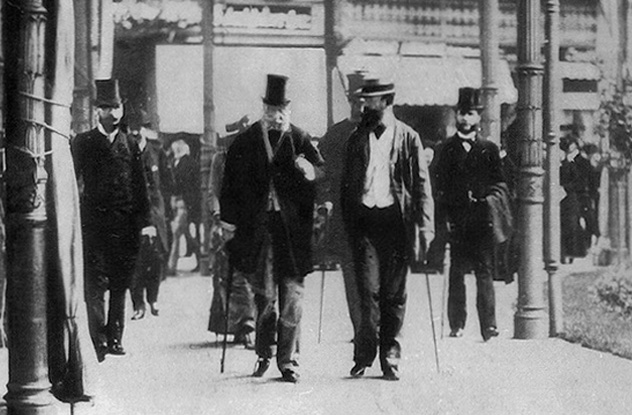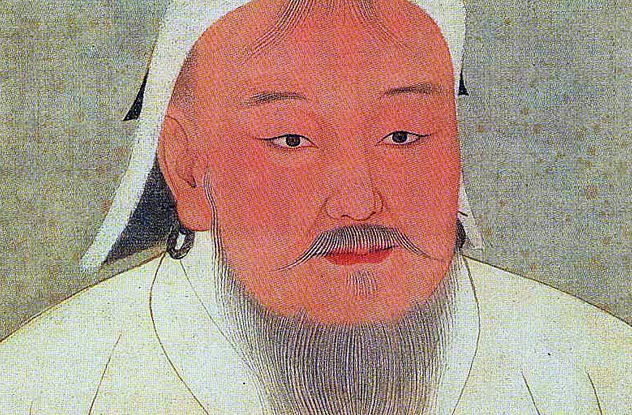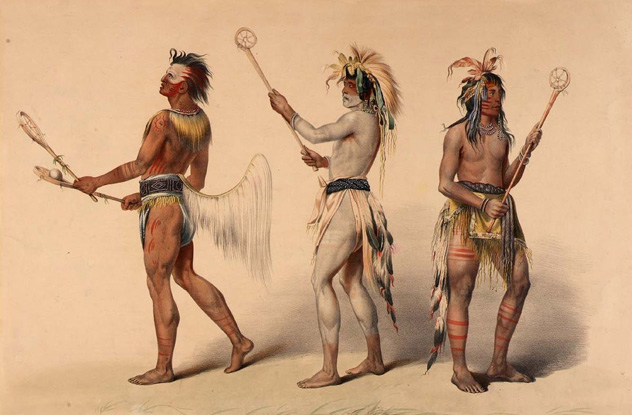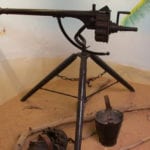 Movies and TV
Movies and TV  Movies and TV
Movies and TV  Music
Music 10 Metal Bands Who Accidentally Created Pop Hits
 History
History Ten Totally Forgotten Deadly American Disasters
 Movies and TV
Movies and TV 10 TV Show Spin-Offs That Surpassed Their Original Series
 Music
Music 10 Deceivingly Happy Songs That Hide Dark Meanings
 Movies and TV
Movies and TV 10 Summer Horror Movies Guaranteed to Give You Chills
 Our World
Our World Ten Weirdly Useful Scientific Facts About Bubbles
 Music
Music 10 ‘Patriotic’ Songs That Actually Criticize America
 Movies and TV
Movies and TV 10 Famous War Films That Flubbed the Facts
 Movies and TV
Movies and TV 10 Must-See Mockumentary TV Shows To Binge Right Now
 Movies and TV
Movies and TV 10 Game-Changing Films That Shook Up the Superhero Genre
 Music
Music 10 Metal Bands Who Accidentally Created Pop Hits
 History
History Ten Totally Forgotten Deadly American Disasters
Who's Behind Listverse?

Jamie Frater
Head Editor
Jamie founded Listverse due to an insatiable desire to share fascinating, obscure, and bizarre facts. He has been a guest speaker on numerous national radio and television stations and is a five time published author.
More About Us Movies and TV
Movies and TV 10 TV Show Spin-Offs That Surpassed Their Original Series
 Music
Music 10 Deceivingly Happy Songs That Hide Dark Meanings
 Movies and TV
Movies and TV 10 Summer Horror Movies Guaranteed to Give You Chills
 Our World
Our World Ten Weirdly Useful Scientific Facts About Bubbles
 Music
Music 10 ‘Patriotic’ Songs That Actually Criticize America
 Movies and TV
Movies and TV 10 Famous War Films That Flubbed the Facts
 Movies and TV
Movies and TV 10 Must-See Mockumentary TV Shows To Binge Right Now
10 Bizarre Military Strategies That Actually Worked
As gruesome as war might be, it presents mankind with ample opportunity to showcase its ingenuity and imagination. Theoretically, it should be a numbers game—the one with the bigger army wins. But that’s not what always happens. Skilled and experienced commanders have secured victory against unfavorable odds through trickery, ruses, and other deceitful tactics.
10Zopyrus’s Painful Ruse

There is a lot of doubt surrounding this Persian nobleman from the fifth century B.C. and his extreme measures to secure Darius the Great’s return to the throne of Babylon. The only source we have is Herodotus, who talks about Zopyrus in Histories.
Darius had a lot of difficulty in retaking Babylon after a massive revolt. Led by Nebuchadnezzar III, Babylon had managed to withstand a 20-month-long siege with no sign of defeat in sight. However, one day, Zopyrus came up with a clever plan to infiltrate the enemy at a huge personal cost. He allowed himself to be mutilated—his ears and nose were cut off—and whipped to seem like he had been punished and exiled by Darius. Zopyrus then convinced the Babylonians that he’d defected from Darius and asked to join them.
Zopyrus had been a high-ranking soldier, so the Babylonians figured he might come in handy, and he received charge of an army. Soon after that, he gained victory after victory against Darius’s forces, who were actually instructed to retreat whenever they saw Zopyrus. This also allowed the Persian to gain the trust of Babylonians quickly. When he saw the perfect opportunity, Zopyrus opened the gates and allowed Darius’s army to conquer Babylon.
9Snakes On A Boat

Everybody has heard of Hannibal’s famous trek through the Alps on elephants. However, that’s not the only victory that cemented Hannibal’s status as one of the greatest military leaders in history. Hannibal had another unusual victory in 190 B.C. during his time in exile. He had sought refuge with Prusias, king of Bithynia, who was warring with King Eumenes II of Pergamon, an ally of Rome. Keen to destroy anyone even remotely associated with Rome, Hannibal met Eumenes in naval warfare. A head-on fight would have been suicidal; Hannibal was heavily outnumbered. However, he had a better plan.
His strategy was two-fold. First, he sought to kill the king. To find out what ship Eumenes was on, Hannibal sent a herald with a message, and this herald was guided to the king’s ship. Knowing this, he instructed his men to concentrate fire on that ship. He had something else in store for the rest of the fleet.
Prior to combat, Hannibal had instructed his men to capture all the live snakes they could find and place them in earthen pots. Then, when the enemy got close enough, Hannibal’s men hurled the pots onto the enemy ships. At first, this looked like a last-ditch attempt from a desperate man, but the Pergamenians soon realized their ships had been infested with hundreds of deadly serpents. Supposedly, half the men jumped overboard, while the other half tried in vain to fight Hannibal while simultaneously fending off vicious snake attacks.
8Bismarck’s Taunting Letter

Otto von Bismarck had an ambitious plan to ensure Prussian dominance throughout Europe. He began with a series of wars that unified German states under the North German Confederation. Next, he had to unify the southern states, which were mostly under French influence. However, he couldn’t just declare war on France, as he wanted the southern states’ support. Instead, he decided to anger France so hard that they would declare war on him.
Bismarck did this with a simple telegram known as the Ems dispatch. He didn’t write it; he received it from the king of Prussia, Wilhelm I. The dispatch concerned a meeting between the king and the French ambassador. Prior to this event, Prince Leopold, a German of the Hohenzollern family, had been considered for the vacant Spanish throne. Fearing a possible alliance between Spain and Prussia, France protested the idea, and Leopold withdrew his commitment. However, France wanted further guarantees that no other Germans would be put forward as candidates.
When Wilhelm met the ambassador, he avoided making any permanent commitments, doing so in a very diplomatic and cordial manner. He wrote of the meeting in the same vein to Bismarck. However, Bismarck released the telegram to the press with some careful edits that made it seem like the king refused any requests made by the French. Angered by this, France went to war and lost. The German states unified in 1871, and Bismarck became the first chancellor of Germany.
7Lord Cawdor’s Bluff

The Battle of Fishguard took place in 1797 and is just one of the many confrontations between England and France. However, unlike most other battles, this one showed us how effective a bluff can be when you say it with the proper conviction.
Initially, it looked like the battle would be a walk in the park for the French. Led by American colonel William Tate, the French had 1,400 troops, while the British only had around half that, mostly militia and reservists. The British were led by Baron Cawdor. Initially, Cawdor wanted to attack the French directly. However, the narrow lanes of Fishguard made his artillery almost useless, he had no trained regulars in his army, and the French outnumbered them.
On the French side, Tate was having his own problems. About half of his troops were irregulars who revolted against him or simply left to pillage the nearby settlements and get drunk. Demoralized at the state of his army, Tate sent his second-in-command to talk about a conditional surrender to Cawdor to avoid bloodshed.
Lord Cawdor played his bluff. Asserting that he had a superior force which was hourly increasing, Cawdor demanded an unconditional surrender from the French. Tate eventually accepted. In the end, the Brits suffered almost no losses but captured over 1,300 French troops, plus a frigate and a corvette.
6BBC’s Broadcasting Blunder

While Lord Cawdor’s brazen bluff worked splendidly, the BBC can be considered to be responsible for a cunning double-bluff that worked in the Brits’ favor, albeit a completely unintentional one. This happened much more recently, during the Falklands War between England and Argentina.
On May 28, 1982, British forces landed and engaged Argentinian troops in the first land conflict of the war at the Battle of Goose Green. A victory here was considered essential for England, not necessarily because Goose Green was an important strategic position but as a morale boost after Argentina’s dominance in prior naval battles. So on May 26, the 2nd Parachute Regiment led by Lieutenant-Colonel Jones headed for Goose Green to stage an assault. In a very bizarre move, the BBC, announced that British forces were headed for Goose Green on international television.
This didn’t go well with British forces, particularly Jones, who threatened to sue the BBC and the British War Cabinet for their incompetence. The Argentinians saw the broadcast but considered it to be deliberate misinformation as nobody would be stupid enough to announce their secret plans on television. Imagine their surprise when the English went through with the plan and began the assault the next day, ending with a victory for England.
5The Shrinking Army

This strategy was used at the Battle of Maling, back in the fourth century B.C., a time when ancient China contained states warring with one another. On a more personal level, this fight was the culmination of a rivalry between two military leaders, P’ang Chuan and Sun Pin, supposedly a descendant of Sun Tzu.
Both men originally served the state of Wei. While feigning friendship, Chuan was actually envious of Sun Pin’s superior skill in warfare and secretly plotted to have him declared a traitor. While he wasn’t executed, Sun Pin was crippled, branded a criminal, and exiled. Despite this, the neighboring Ch’i (Qi) state was happy to enlist his services.
So now both men were in charge of opposing armies, finally ready to fight each other. However, the Ch’i had a reputation of being cowards, something Sun Pin was keen to exploit. First, he simply retreated when Chuan’s army approached. On the first night, he ordered 100,000 cooking fires lit. On the second night, he ordered only 50,000 fires. On the third night, he ordered just 20,000.
From Chuan’s perspective, it looked like Sun Pin’s army was getting smaller and smaller. He became convinced that most of the Ch’i army had deserted. Wanting to finally catch up to Sun Pin, Chuan, took only his light cavalry units and went in pursuit. Sun Pin had an ambush ready at Maling Pass, where his crossbowmen shot down all of Chuan’s army.
4The Swallows Of Volohai

Animal lovers might want to skip this one. It involves the (possibly apocryphal) legend of Genghis Khan’s cruel but clever tactic to capture the fortress-city of Volohai. The invasion of China was one of Genghis’s most ambitious plans, and as soon as his army reached Volohai, it seemed that his ambitions might have been folly. The Mongols’ most prized asset was a fearsome cavalry, which was made useless by heavy city fortifications.
This prompted Genghis Khan to make one of the oddest requests in the history of war. He claimed that he would lift the siege on Volohai and leave in exchange for a tribute of 1,000 cats and 10,000 birds (usually thought to be swallows).
This caused a lot of bewilderment in Volohai, but the city commanders complied. Soon enough, they rounded all the cats and birds they could find in the city and sent them to the Mongols as a gift. Genghis next ordered his men to take all of the animals, tie a tuft of cotton to each of their tails, and set them on fire. The animals panicked and ran back to their homes in the city. All of a sudden, Volohai was overcome with hundreds, even thousands of fires that completely overwhelmed its population and allowed the Mongols to conquer the city.
3Wolf In Ship’s Clothing

This strategy was employed by the British first during World War I and then in World War II and involved using armed military ships disguised as harmless merchant vessels. They were known as Q-ships and proved to be quite successful at taking down German U-boats.
They were conceived at the beginning of World War I. German submarines were proving to be devastating on the English fleet as more and more of its sea-lanes were experiencing regular ambushes that typically resulted in a German victory. It didn’t help that the submarines were relatively invincible as long as they stayed submerged, as depth charges weren’t particularly effective against them. Only when the U-boats rose to the surface were they vulnerable to attack.
The English noticed that the German submarines usually surfaced when attacking small vessels or merchant ships and sank them using gunfire. This allowed them to save their torpedoes for warships and stay out at sea longer before having to resupply. That is how the idea of Q-ships arose. The vessels would entice submarines to surface but have secret armaments that could be used when the U-boats were vulnerable.
The British went to great lengths to disguise the military vessels. Besides hiding the weapons using dummy structures and fake boats, the crew were also sometimes in disguise, even dressed as women on occasion.
2An Unsporting Strategy

Those familiar with the sport of lacrosse might know that it traces its origins to several games played by Native American tribes. The Ojibwe, for example, had a game called baaga’adowe or baggatiway. And in 1763, they used it to take over Fort Michilimackinac in Michigan.
The Ojibwe were camped right next to the fort, so the two groups were quite used to seeing each other. For the most part, relations between them were cordial. Besides English, Fort Michilimackinac also had French settlers, as it was a prime spot for French fur trading. And these people had gotten quite used to watching the Ojibwe play baggatiway, even betting on the outcome and cheering them on. So on June 2, 1763, it looked like it would be just another game between the Ojibwe and the Sac, staged right outside the gates of the fort.
The Ojibwe even invited fort commander Major George Etherington and his men to come outside and watch them play. And they did just that—not only leaving their weapons behind but also leaving the gate open. Nobody gave it a second thought when the ball went over the wall and some of the players rushed inside the fort to get it. In reality, the players armed themselves with weapons hidden by the Ojibwe women and quickly killed about 20 soldiers while taking the rest hostage. They then proceeded to plunder the fort, killing all the English but sparing the French.
1Zhang Xun’s Siege Trickery

The siege of Yongqiu in 756 during the An Shi Rebellion perfectly illustrated how strategy and deception can overcome far superior numbers. Inside the castle was an army of 2,000 men led by Tang Dynasty general Zhang Xun. Outside the castle was a Yan Dynasty army roughly 40,000 men strong. And yet the Tangs would win this battle decisively.
Zhang Xun employed several tricks to gain the advantage. At night, his troops played war drums to keep the outside army awake and ready for battle. Night after night, the war drums played, but nothing happened. Eventually, the Yan soldiers started ignoring the drums. Zhang’s forces then attacked the unsuspecting troops, causing thousands of casualties. Later on, this kept the invading army up all night out of fear, drums or no drums, leading to a tired and demoralized army.
Zhang employed his most clever tactic when his men were starting to run out of arrows. He ordered hundreds of straw dummies made, dressed them as soldiers, and lowered them down the wall of the castle. When they saw the supposed soldiers, the enemy opened fire on them, leaving many arrows embedded in the dummies. Zhang’s men then simply pulled them up and collected the arrows. He repeated this trick until he saw that it no longer worked. At that point, he replaced the dummies with real soldiers, who, again, took the enemy by surprise.
Follow Radu on Twitter.








